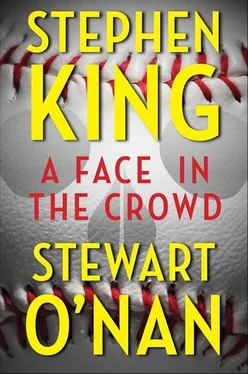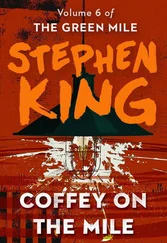Evers turned off the TV and decided he’d go to bed early.
Useless. Sleep didn’t come at ten or at midnight. At two o’clock he took one of Ellie’s Ambiens, hoping it wouldn’t kill him—it was eighteen months past the expiration date. It didn’t, but it didn’t put him to sleep either. He took another half a tablet and lay in bed thinking of a plaque he’d kept in his own office. It said GIVE ME A LEVER LONG ENOUGH, A FULCRUM STRONG ENOUGH, AND I’LL MOVE THE WORLD. Far less arrogant than Wheeler’s plaque, but perhaps more useful.
When Wheeler refused to let him out of the partnership agreement Evers had foolishly signed when he’d been young and humble, he’d needed that kind of lever to shift his partner. As it so happened, he had one. Leonard Wheeler had a taste for the occasional young boy. Oh, not young young, not jailbait, but college age. Wheeler’s personal assistant, Martha, had confided to Evers one rum-soaked night at a convention in Denver that Wheeler was partial to the lifeguard type. Later, sober and remorseful, she’d begged him never to say a word to anyone. Wheeler was a good boss, she said, hard but good, and his wife was a dream. The same was true of his son and daughter.
Evers kept mum, even keeping this nugget from Ellie. If she’d known he intended to use any such scurrilous information to break the partnership agreement, she would have been horrified. It’s surely not necessary to stoop to that, she would have said, and she would have believed it. El thought she understood the bind he was in, but she didn’t. The most important thing she didn’t understand was that it was their bind—hers and little Patrick’s as well as his own. If Speedy went nationwide now, they’d be crushed by the giants within a year. Two at the outside. Evers was dead certain of it, and had the numbers to back it up. All they’d worked for would be washed away, and he had no intention of drowning in the sea of Lennie Wheeler’s ambitions. It could not be allowed.
He hadn’t opened with Fuck you, Lennie . First he tried the reasonable approach, using the latest spreadsheets to lay out his case. Their market share in New England was due to their ability to rent one-way and at hourly rates the big boys couldn’t match. Because the area they covered was so compact, they could rebalance their entire inventory within three hours, where the big boys couldn’t and had to charge a premium. On September 1, move-in day for the students, Speedy owned Boston. Spread the fleet thin trying to cover the Lower 48 and they’d have the same headaches as U-Haul and Penske—the same lumbering business model they purposely avoided and undersold. Why would they want to be like the other guys when they were killing the other guys? If Wheeler hadn’t noticed, Penske was in Chapter 11, Thrifty too.
“Precisely,” Wheeler said. “With the big boys on the sidelines, this is the perfect time. We don’t try to be like them, Dean. We chop the country into regions and do what we already do.”
“How does that work in the Northwest?” Evers asked. “Or the Southwest? Or even the Midwest? The country’s too big.”
“It may not be as profitable at first, but it won’t take long. You’ve seen our competition. Eighteen months—two years tops—and we’ll be absolutely killing them.”
“We’re already overextended, and now you want us to take on more debt.”
As they went back and forth, Evers honestly believed in his argument. Even for a publicly owned company, the problems of capitalization and cash flow were insurmountable—a judgment that would prove devastatingly true two decades later, when the downturn hit. But Lennie Wheeler was used to having his way, and nothing Evers said would dissuade him. Wheeler had already talked with several venture capital concerns and printed up a sleek-looking brochure. He planned to take his proposal directly to the shareholders, over Evers’s protests, if necessary.
“I don’t think you want to do that,” Evers said.
“And why’s that, Dean?”
He’d tried, really tried, to do this ethically, honorably. And he knew he was right; time would prove it. In business everything was a means to one end—survival. Evers felt it urgently then and still thought it true today: He had to save the company. Hence, the nuclear option.
“I don’t think you want to do that because I don’t think you’d like what I’d take to the shareholders’ meeting. Or should I say, whom.”
Wheeler laughed, a sick little chuckle. He stared at Evers as if he’d pulled a gun. “Whom?”
“We both know whom,” Evers said.
Wheeler slowly rubbed a hand up the side of his face. “I was wondering why you walked in here like you’d already won something.”
“We’re not winning anything. We’re avoiding a mistake that would lose us everything. I’m sorry it came to this. If you’d have just listened to me—”
“Fuck you, Dean,” Wheeler said. “Don’t try to apologize for blackmail. It’s bad manners. And since it’s just the two of us, why don’t you roll those spreadsheets tight—that’s the only way you’ll get them up that narrow ass of yours—and admit the truth: you’re a coward. Always were.”
Within a year, Evers bought him out. The split was expensive, and, in retrospect, a better deal than Wheeler deserved. Lennie left New England, then his wife, and finally, in an ER in Palm Springs, this earthly vale of tears. Out of respect, Evers flew west for the funeral, at which, not surprisingly, there were no lifeguard types, and, of the family, only the daughter, who dryly thanked Evers for coming. He didn’t say the first thought that had come into his mind: Sarcasm doesn’t become fat girls, dear . A few years later, after a thorough vetting of the numbers and fueled by Bain Capital, Speedy actually did go national, using a streamlined version of their old regional plan. That Evers had been right—that it ended with Speedy’s lawyers filing the same Chapter 11 briefs as their vanquished rivals—was little vindication. He came out of it with a goodly sum, however, and that was.
The funny thing was that with a minimum of digging—an offhand question or three to Martha, a keen read of her blinking—Wheeler could have bought himself an ironclad insurance policy. When Evers realized this, he gently dropped her, which, because they both had a conscience, was actually a relief. Their fling had run its more than pleasant course, and rather than fire her, he kept her closer, making her his executive assistant at double the salary, working beside her day in, day out until, eventually, she accepted a lavish early retirement package. At her farewell party, he made a speech and gave her a Honda Gold Wing and a peck on the cheek, to raised glasses and warm applause. The affair ended with a slide show featuring Martha on her old Harley Tri-Glide, while George Thorogood sang “Ride On Josephine.”
It was a rare moment for Evers, a happy parting. Beyond the silly intrigue, he’d always liked Martha, her brash laugh and the way she hummed to herself as she typed, a pencil tucked behind one ear. What he said in his speech—that she wasn’t merely an assistant but a dear and trusted friend—was true. Though he hadn’t spoken to her in ages, of all the people he’d worked with, she was the only one he missed. Drowsing now as the Ambien kicked in, he wondered hazily if she was still alive, or if, tomorrow, he’d turn on the game and find her behind home, wearing the sleeveless yellow sundress with the daisies he liked.
He rose at eight—a full hour past his usual time—and stooped to pick the paper from the mat. He checked the sports page and discovered the Rays had the night off. That was all right; there was always CSI . Evers showered, ate a healthy breakfast in which wheat germ played a major role, then sat down to track Young Doctor Young on the computer. When that marvel of the twenty-first century failed (or maybe he just wasn’t doing it right; Ellie had always been the computer whiz), he picked up the telephone. According to the morgue desk at the Shrewsbury Herald-Crier, the dental bogeyman of Evers’s childhood had died in 1978. Amazingly, he’d been only fifty-nine, nearly a decade younger than Evers was now. Evers pondered the unknowable: was his life cut short by the war, Luckies, dentistry, or all three?
Читать дальше











